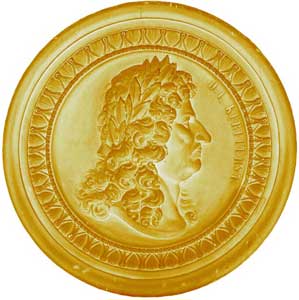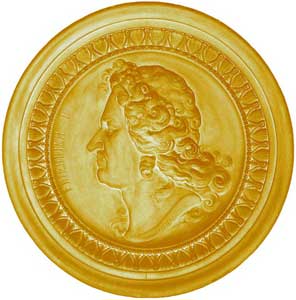As a result the first refugees appeared in Brandenburg in 1685 and asked the elector to be taken up here. With the Edict of Potsdam (October 1685) Friedrich Wilhelm of Brandenburg offered the fleehing French Reformists residential status and start-up financing. Part of the welcome measures were religious freedom, the supply of a house, garden, agricultural cropland, the right to practice a trade, their own school system, their own administration of justice and full tax exemption for 6, 12 and more years. Only a tax like the former French tax 'accise' was levied on food and luxury goods. With these measures the elector hoped for a revitalisation of the economy after the disasterous Thirty Year's War, which destroyed Brandenburg. In this way he laid the groundwork to strengthen Prussia.
 Friedrich-Wilhelm - the Great Elector of Brandenburg reigned from 1640 until 1688 |
 Friedrich I - formerly Elector Friedrich III of Brandenburg reigned from 1688 until 1713 |
Both medalions are put up on the inside of the east wall of Petri Church. They were donated by the elder and master bricklayer Orthloff on the occasion of the 200th anniversary of the Reform Petri Congregation in 1891.
Next: The Huguenots' arrival
Previous: Prehistory